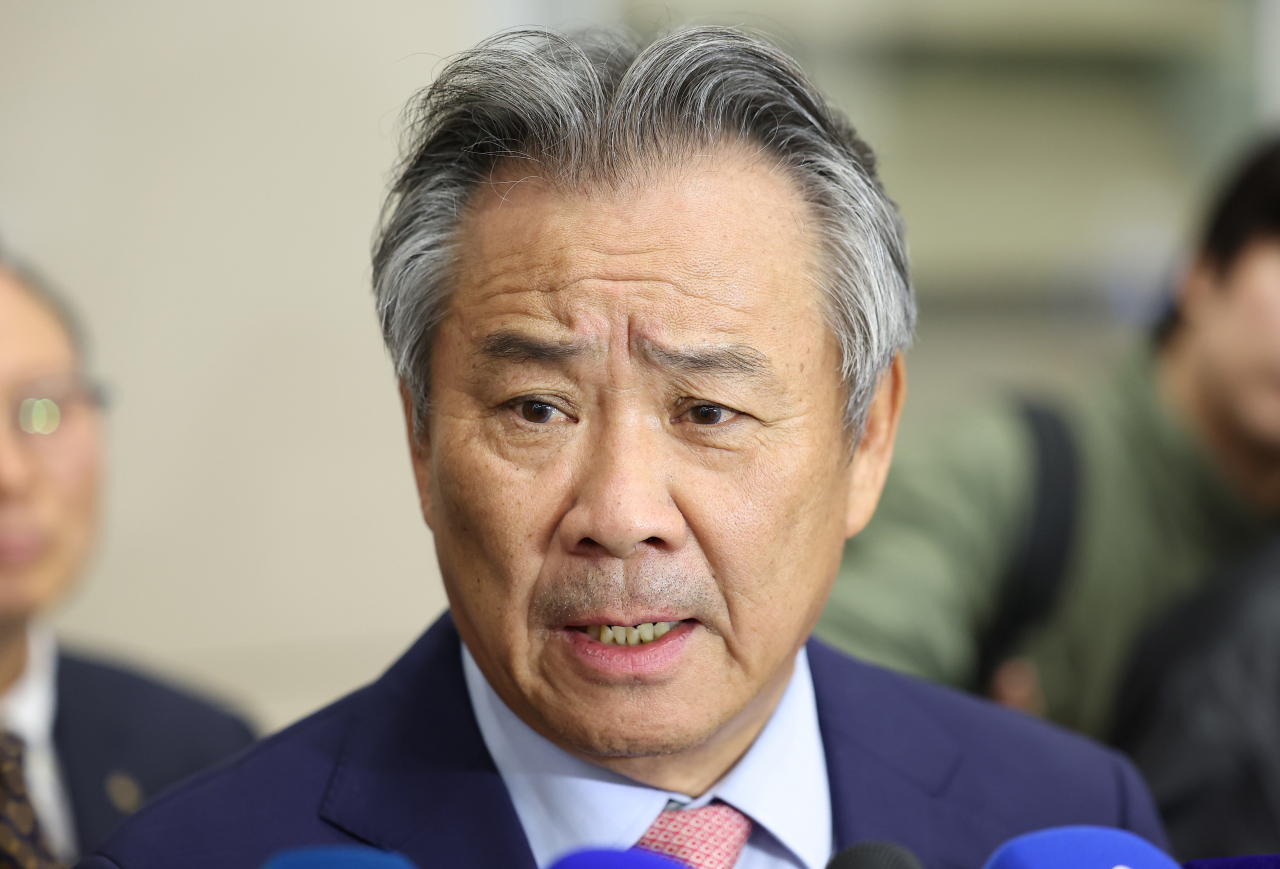 |
Lee Kee-heung, suspended president of the Korean Sport & Olympic Committee, speaks to reporters at Incheon International Airport, west of Seoul, Friday. (Yonhap) |
The national Olympic chief Lee Kee-heung said Wednesday he was not yet prepared to make a decision on whether to run for his third term at the helm of the top sports body, despite being given clearance to do so by his own organization this week.
Lee, president of the Korean Sport & Olympic Committee (KSOC), returned home from Switzerland, where he had attended the World Union of Olympic Cities Sport Summit earlier in the week. He decided to come home a day earlier than initially scheduled.
During Lee's absence, the sports ministry suspended him from his duties on Monday, a day after a team of government inspectors accused the KSOC honcho of a series of illegal actions, including embezzlement and illicit hiring at the top national training center for Olympic athletes. The inspectors said they would ask police to further investigate the situation.
Despite the suspension, Lee was cleared to run for a third term by the KSOC's own fair play subcommission on Tuesday.
Lee, 69, was first elected to the top KSOC post in September 2016 and won a second term in 2021. Per KSOC statutes, its president may run for a second term without restrictions, but a bid for a third term must be approved by the Commission for Fair Play in Sport.
He is still allowed to run for president while suspended. The election is scheduled for Jan. 14, 2025.
Lee has long been expected to run for his third consecutive term but he told reporters Wednesday he would take his time to make that decision.
"I have decided to put off that decision," Lee said at Incheon International Airport, west of Seoul. "Personally, since I have served two terms, I've thought about stepping aside and preparing for a new chapter in my life. I've even bought my retirement home. However, I will speak with former KSOC presidents and leaders of regional sports federations and then make the decision on my future. Right now, it's difficult for me to comment further on that."
When pressed what the timetable will be, Lee said with a smile, "It won't take long."
Before the subcommission met Tuesday to review Lee's bid for the new term, Lee filed for a court injunction to nullify the sports ministry's suspension.
Lee was accused by the government inspectors of ordering the relaxation of job requirements at the Jincheon National Training Center in order to hire a friend of his daughter's, and also of bypassing an internal report to lower the applicant's salary and replacing an official who opposed Lee's hiring plan.
The government inspectors also found that Lee had approved a plan to ask the head of a national sports governing body to pay for equipment provided to South Korean Olympic athletes, worth some 80 million won ($57,180). The person who made the payment on the KSOC's behalf was a longtime associate of Lee's and had expressed an interest in securing a key position with South Korea's delegation to the Paris Olympics. The government inspectors said the person ended up getting the job he wanted.
According to the inspectors, Lee also allegedly distributed sponsored goods, including mobile phones, shoes and sunglasses, to his friends and acquaintances without keeping proper records.
When asked about these charges Wednesday, Lee said, "I do not agree with any of these charges," before spending the next several minutes refuting the government's allegations.
Lee, a member of the International Olympic Committee (IOC) since 2019, said he met with IOC officials during his European trip. He said they expressed concerns that the South Korean government's action toward the KSOC would threaten the autonomy of the Olympic body.
The IOC's Olympic Charter points out that all national Olympic committees "must preserve their autonomy and resist all pressures of any kind, including but not limited to political, legal, religious or economic pressures which may prevent them from complying with the Olympic Charter."
"I got the impression that they would keep monitoring the situation and have some sort of talk with our government," Lee said.
Lee was elected to the IOC in his capacity as president of the KSOC, meaning that he must remain as KSOC chief to retain his IOC membership. His IOC term is set to expire next year regardless.
The age limit for IOC members is set at 70, and their terms are to end on the final day of the year in which they turn 70. Lee turns 70 in January 2025.
A one-time extension of the term, for a maximum of four years beyond 70, can be granted upon recommendation by the IOC Executive Board, but such extensions are mostly given to those deemed to have made special contributions to the Olympic Movement.
The sports ministry blasted the KSOC's decision to clear the path for Lee on Tuesday, saying it could no longer count on the Olympic body to be fair and that it would take all necessary steps to address the issue. (Yonhap)







